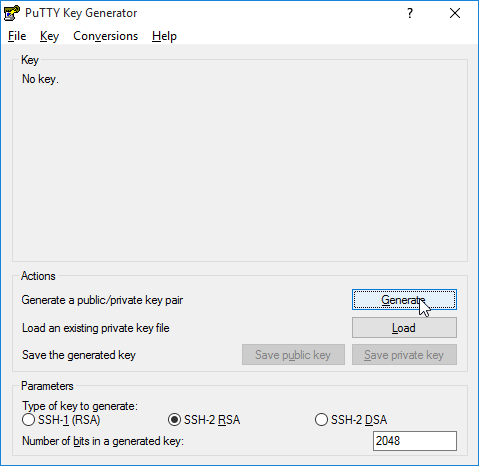
dsa for SSH-2 protocol: The file in which you save the keys should be in /home/user_name/.ssh/id_dsa. rsa for SSH-2 protocol: The file in which you save the keys should be in /home/user_name/.ssh/id_rsa. rsa1 for SSH-1 protocol: The file in which you save the keys should be in /home/user_name/.ssh/identity. Note: The -t option specifies the type of the key to create. To create the public and a private keys, on the computer from which you will be connecting to various computers, generate SSH key pairs as follows (I recommend using the RSA ~]$ ssh-keygen -t rsa -b 2048 This will represent the user's account on the remote machine - the machine that you will be accessing via ssh. This will represent the user's account on the local machine - the machine that you are physically sitting in front user_name]$ In this tutorial there will be two machines ~]$ It is currently difficult to obtain the private key from the public key. RSA can be used for both encryption and digital signatures. DSA has an intrinsic weakness which makes it very easy to create a signature which contains enough information to give away the private key! The Rivest-Shamir-Adleman public-key algorithm (RSA) is the most widely used asymmetric cipher. DSA can only be used to provide digital signatures and can't be used for encryption. National Institute of Standards and Technology (NIST) as part of the Digital Signature Standard (DSS). National Security Agency (NSA), and promulgated by the U.S. The Digital Signature Algorithm (DSA) was developed by the U.S. #Create ssh keys free
SSH-2 is a commercial product, but is available free for use by qualifying educational entities. SSH2 and the superior SSH-2 protocol were released in 1998. It is still distributed and maintained, though not actively developed (bug fixes only).

SSH1 and the SSH-1 protocol were developed in 1995 by Tatu Ylonen, a researcher at the Helsinki University of Technology in Finland. SSH will then connect to those machines with keys instead of your standard account password. The public key can be put on the machines you wish to communicate with. SSH generates a private and a public key. Using keys, SSH can authenticate you to all your computer accounts securely without the need to memorize many passwords or enter them repeatedly. SSH has various authentication mechanisms and the most secure is based on keys rather than passwords. It is designed for logging into and executing commands on a remote machine, as well as moving files back and forth between the two machines. SSH is both a program and a network protocol that provides strong authentication and secure encrypted communications between two machines over an insecure network. SSH keys and SSH key generation Background and Terminology: SSH - Secure Shell





 0 kommentar(er)
0 kommentar(er)
